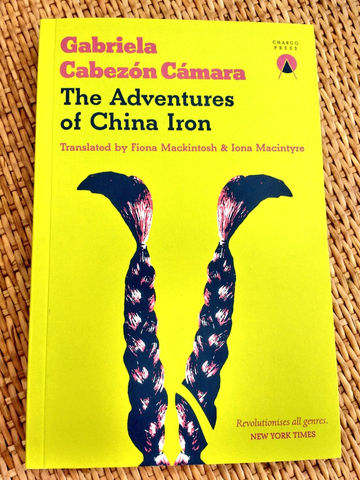Best Reads of 2019
- Dec 29, 2019
- 4 min read
Updated: Dec 30, 2019
It’s that time of year…yes, it’s another “best of” list. Here are my top picks of the books I’ve read in 2019. The list is not limited to books published this year as, while I understand that such lists have value, I don’t think a book’s shelf life (pun intended) or window for being celebrated should be limited to the calendar year it was released in. So, these are my favourite things I read this year, regardless of publication date, genre, original language or anything else, just good books. In no particular order...
Ghost Wall – Sarah Moss (Granta Books)
A short, absorbing novel that feels incredibly timely and is the perfect antidote to Brexit-related xenophobia. Silvie’s family are taking part in an Iron Age-style camp as part of an archaeological experiment. Her father is obsessed with romanticising the past and the notion that if he goes far back enough in time, he can find the true British. For Silvie, the patriarchal repression of her father is juxtaposed with the enlightenment and freedom experienced through interacting with the archaeology students. Everyone in the UK should read this.
State of Emergency – Jeremy Tiang (Epigram)
A terrific novel that covers some key moments in Singaporean history and its relationship with Malaysia and Britain, with a focus on leftist movements. In six interconnected but separate chapters, each focusing on a different character, Tiang explores themes including colonialism, labour movements, human rights, political detentions, capitalism and guerrilla warfare. Cleverly structured, ambitious in scope, and fascinating. The pick of the Singaporean books I reviewed earlier this year.
Las Cenizas del Comal – Francisco Martínez Criado (Ediciones Lacre)
Based on the experiences of the author from his time working with NGOs in Central America, this work is a political and folk history of El Salvador, interspersed with personal recollections, characters from all walks of life and even an improbable love story. It examines, amongst other things, the role of Spanish colonisers and the meddling US government in the region’s history and current situation. It packs a lot into a short space and besides being informative and a real eye-opener, it is also very relevant in the current political climate, particularly for its authentic tales of those who attempt to cross the border to the US and what they have to go through to do so. Full review here: https://andymcd.wixsite.com/aviewfromthebook/post/2019/08/24/review-las-cenizas-del-comal-by-francisco-martinez-criado. Martínez has just won the Premio Certamen de Literatura para Escritores Noveles for his second book, Raza Maldita, which is sure to be one to look out for in the coming year.
The Valley at the Centre of the World – Malachy Tallack (Canongate)
Set amidst the whirling rain, fierce wind and copious sheep of Shetland, this novel examines absence and loss, the different forms these can take and how those left behind react and cope. This is a work that looks at universal themes and isolated rural life at the same time, just as it is simultaneously a novel about place and one that questions the possibility of writing about place. The third-person narrative shows us the viewpoint of most of the valley’s inhabitants, but the main character is Sandy, whose girlfriend Emma has just left him. Sandy’s nearest neighbours are her parents, with whom he continues to have a close relationship. Full review here.
Caderno de Memórias Coloniais – Isabela Figueiredo (Caminho)
This was one of the books I read for this year’s And Other Stories Portuguese Reading Group. Figueiredo’s father was a Portuguese colonialist in Mozambique and here she recounts her experience of growing up there and later being sent “back” to Portugal when the African nation gained its independence. The book is a fierce critique of imperialism and exposes the institutionally racist and patriarchal structures that held colonialist rule together. One of the remarkable things it does is to not hide from this racism; it lays it out in all its ugly, uncensored offensiveness. Figueiredo is writing about the Portuguese in Mozambique, but it could easily have been any colonial power in any other country. While Figueiredo’s father is not portrayed as a pleasant man, there is a complexity to their relationship, as despite everything she clearly loved him and craved his affection.
Leonard and Hungry Paul - Rónán Hession (Bluemoose Books)
A truly nice - in the best sense of the word - novel about two introverted friends who socialise over board games. In a world that is ever more ruthless and rushed, this book looks at the value of kindness, friendship and pause, while reflecting on what it is to be introverted. A current that runs through the novel is a celebration of the joy of reading and appropriately it is itself a lovely read. On that note, if you're not already following the author on Twitter, you should rectify that as he has excellent taste in books and is always sharing diverse and brilliant recommendations.
The Adventures of China Iron - Gabriela Cabezón Cámara (translated by Fiona Mackintosh and Iona Macintyre) (Charco Press)
I was particularly looking forward to this book as both the translators taught me as an undergraduate at Edinburgh University. I'm happy to report that it did not disappoint. Set in rural late nineteenth century Argentina, the titular character embarks on a journey with a Scottish woman after their husbands are conscripted. China is escaping her old life and entering a new world. For her, the road trip is one of discovery and liberation, as Liz introduces her to new words, tastes and pleasures. As her horizons broaden, she begins to see how the world is both vaster and more interconnected than she could have imagined. A pleasure to read, this is a multifaceted novel that gives plenty to think about on themes such as feminism, imperialism, nature and more.





Comments